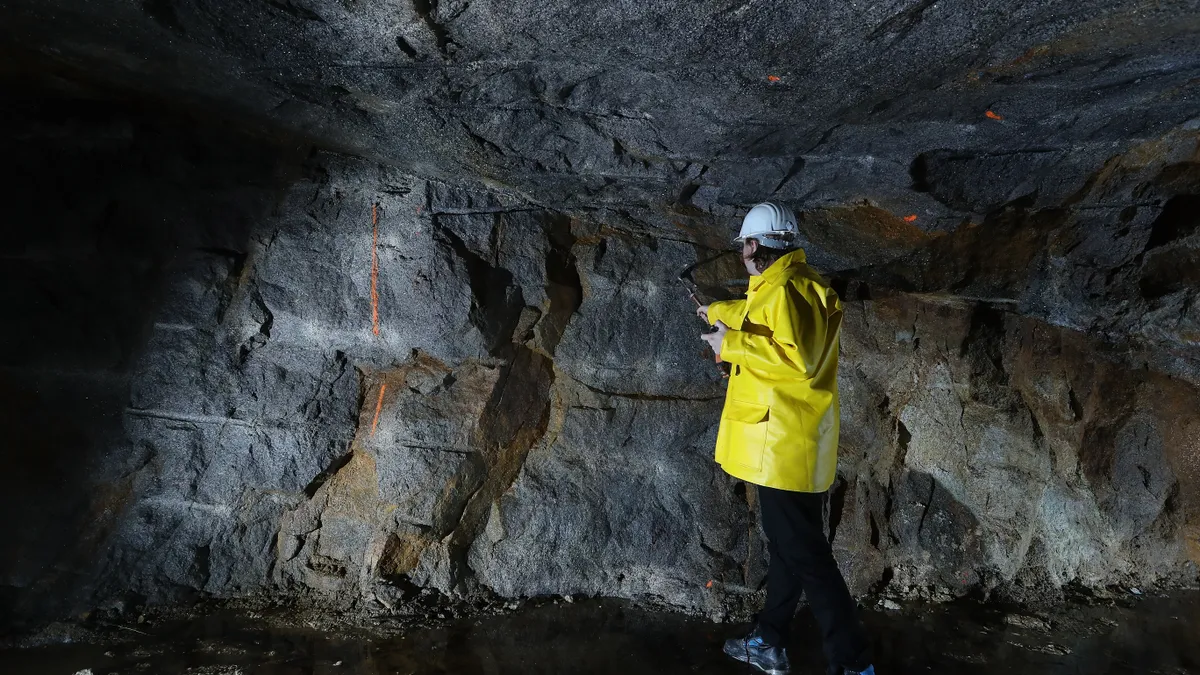Dive Brief:
- The bipartisan infrastructure bill now gaining momentum in Congress could provide a badly-needed boost to U.S. efforts to boost production of critical minerals, which play a key role in the renewable energy sector, Sen. Lisa Murkowski (R-Alaska) noted at a conference Tuesday hosted by the Bipartisan Policy Center.
- The $1 trillion proposal is expected to include money for research and demonstration projects and other efforts aimed at lessening the reliance on China for the supply of critical minerals like lithium, used in EV battery production, according to David Turk, undersecretary at the U.S. Department of Energy, in remarks at the BPC event. After weeks of intense negotiations, senators voted on Wednesday 67-32 to advance the latest version of the bipartisan infrastructure deal, securing the support of 17 Republicans, including Minority Leader Mitch McConnell.
- The United States currently imports more than half of its annual consumption for 31 of 35 critical minerals, which range from lithium used in EV batteries to Tellurium used in solar cells, creating a major "vulnerability" for the country, Murkowski noted in her remarks at the event.
Dive Insight:
Overall, China accounted for 80% of all rare earths imports to the U.S. from 2015 to 2018, the U.S. Geological Survey reports.
The critical minerals are vital in a range of industries, including renewable energy. EV cars require six times the amount of critical minerals than their traditional, internal combustion engine counterparts, while an offshore wind plant "requires nine times more mineral resources than a gas-fired plant," according to a report by the International Energy Agency.
Over the past decade, the amount of minerals needed for new power generation has risen by 50%, the result of the increasing importance of renewable sources of energy, the report notes.
The threat to U.S. security posed by China’s dominance in the critical mineral sector was a major theme of Tuesday’s conference hosted by the Bipartisan Policy Center.
China has spent more than a decade investing in the mining, processing and production of critical minerals, with the emerging EV sector relying on China for batteries, according to Murkowski.
"China has been the powerhouse on the world stage in regards to critical minerals, not just the supply, but also the processing of them," Murkowski said, calling this dominance a "long-term national security threat" to the country.
However, the bipartisan infrastructure bill could play a key role in helping the U.S. to close the gap with China in this key area, said Murkowski, who has been involved in negotiations on the bill.
The energy provisions of the bipartisan bill will call for a mapping of critical mineral resources in the U.S., Murkowski said.
Another provision calls for streamlining the permitting process for mining and extracting critical minerals, Murkowski said, adding it can take 12 years now to line up the federal permits needed to open a mine. That, in turn, can cause businesses to "hesitate to deploy any investment capital."
"We are trying to move these along — jump start them if you will," Murkowski said. "My bill aims to improve the timeliness of the federal permitting and review process," she said of legislation that would be incorporated into the bipartisan infrastructure bill.
The agreement passed by Senate on Wednesday includes $550 billion in new spending, but still needs to be turned into formal text and will likely face rounds of amendments before facing both chambers of Congress.
The Biden administration, in turn, is moving more aggressively when it comes to recycling efforts related to critical minerals and looking to allies such as Canada for critical mineral extraction, she said.
Murkowski said she would instead like to see more efforts to boost critical mineral mining and extraction in the U.S. and in her home state of Alaska as well.
"We have some extraordinary potential and want to be able to prove that, Murkowski said.
Meanwhile, David Turk, deputy secretary at the Department of Energy, said the bipartisan infrastructure bill will provide a crucial boost in funding for various demonstration and research projects related to the supply of critical minerals.
"Our economic competitors have been thinking about this for years and more importantly working on this for years," Turk said at the conference. "This ups our game significantly."














